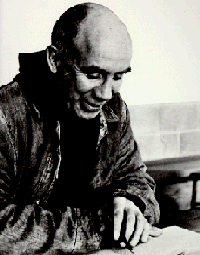In our discussion about how the Second Law of Entropy plays into this problem, "betty" helped me to better understand how life itself is an expression of the 2nd Law, not a contridiction of it. Here is what she has to say in full:
Oh, so that's the big deal with entropy...we living creatures so badly wanting to avoid it! We are living contradictions to the 2nd Law.
Actually Ronzo, I think Dennett had it all wrong to speculate that living systems somehow contradict the second law, that they have some way to "beat" its application to themselves, by maybe "paying the entropy tab." I rather think that we living creatures are in a certain way the fulfillment of the second law. Consciousness (sentience, awareness, self-consciousness) is the key that turns this lock.
But in order for this insight to be valid, Boltzmann's model would need to be recognized for the restrictive view that it is. Boltzmann himself recognized that his analysis pertained to "perfect gases" only; extrapolating from there to living organisms is fraught with peril, cosmologically speaking. :^) Or so it seems to me.
Swenson writes (in "Thermodynamics, Evolution, and Behavior," 1997):
"In Clausius' (1865) words, the two laws thus became: "The energy of the world remains constant [first law of thermodynamics]. The entropy of the world strives to a maximum [second law]," and with this understanding, in sharp contrast to the "dead" mechanical world of Descartes and Newton, the nomological basis for a world that is instead active, and end-directed was identified. Entropy maximization as Planck first recognized provides a final cause, in Aristotle's typology, of all natural processes, "the end to which everything strives and which everything serves" or "the end of every motive or generative process" (Bunge, 1979). … The active, macroscopic nature of the second law presented a profound blow to the mechanical world view which Boltzmann attempted to save by reducing the second law to the stochastic collisions of mechanical particles, or a law of probability."
I am so struck (awestruck is more like it) by the profound resonances of these two laws to Heraclitus' (c. 500 B.C.) philosophy. Swenson writes [ibid.]:
"The first and second laws of thermodynamics are not ordinary laws of physics. Because the first law, the law of energy conservation, in effect, unifies all real-world processes, it is thus a law on which all other laws depend. In more technical terms, it expresses the time-translation symmetry of the laws of physics themselves. With respect to the second law, Eddington (1929) has argued that it holds the supreme position among all the laws of nature because it not only governs the ordinary laws of physics but the first law as well. If the first law expresses the underlying symmetry principle of the natural world (that which remains the same) the second law expresses the broken symmetry (that which changes). It is with the second law that a basic nomological understanding of end-directedness, and time itself, the ordinary experience of then and now, of the flow of things, came into the world. The search for a conserved quantity and active principle is found as early as the work of Thales and the Milesian physicists (c. 630-524 B.C.) and is thus co-existent with the beginnings of recorded science, although it is Heraclitus (c. 536 B.C.) with his insistence on the relation between persistence and change who could well be argued to hold the top position among the earliest progenitors of the field that would become thermodynamics. Of modern scholars it was Leibniz who first argued that there must be something which is conserved (later the first law) and something which changes (later the second law)."
Heraclitus, sometimes called the “Riddler,” could say: “The unapparent connection is more powerful than the apparent one” [Fragment 54]; for “Nature loves to hide” [Fragment 123].
A. Grandpierre’s observation [2005, WIP] that, “the realm of the Finite [existence] cannot exist without the realm of Infinity, since the Finite can change only by its connection with Infinity, and it can maintain itself only through continuously changing” is a profound recapitulation of Heraclitus’ central insight about the Universe: That it is a One that can maintain itself and “evolve” only by undergoing a process of ceaseless change.
Grandpierre refers to what we might call the “cybernetic concept of Life”: “Life is the basic activity of the Universe that continuously sews together the existing universe with the universe of possibilities. Life sews together the actualized possibilities and generates a much larger set of new possibilities.”
Entropy maximization is the universal process that connects existent reality to the non-existent (not yet manifested, but potentially manifestible) "realm of possibilities." And thus the universe has a "future" to evolve into (so to speak). I have a deep suspicion that biological self-organizing processes -- which are seemingly informative or information-based processes -- have a critical role to play in universal entropy maximization.
Just some thoughts....
Thanks so much for writing, Ronzo!


No comments:
Post a Comment